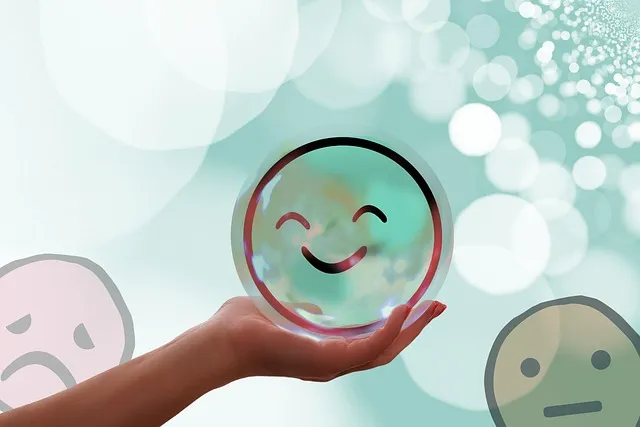Emotion regulation is a powerful skill taught by Lafayette Kaiser Permanente behavioral health professionals, enabling individuals to manage and understand their emotions effectively. By identifying triggers, practicing mindfulness, and using cognitive strategies like reappraisal, people can reduce negative feelings, prevent impulsive actions, and improve overall well-being. These techniques enhance relationships, decision-making, and resilience, while community outreach programs empower people to take charge of their mental health. Lafayette Kaiser Permanente's services offer valuable resources, including social skills training and trauma support, combining approaches to help individuals resolve conflicts, process past traumas, and develop robust emotional management tools. Mindfulness and body-based techniques, such as deep breathing and yoga, are recommended for cultivating present-moment awareness and improving communication. Practicing empathy and fostering social connection are key elements in teaching these skills, promoting deeper connections and overall well-being.
Emotion regulation techniques are essential tools for navigating life’s challenges. This guide, brought to you by Lafayette Kaiser Permanente Behavioral Health services, explores powerful strategies to manage emotions effectively. From cultivating awareness of triggers to cognitive restructuring and mindfulness practices, we’ll delve into actionable steps. Additionally, we’ll discuss the importance of empathy and social connection in emotional well-being. Understanding these techniques can enhance resilience and overall mental health, empowering you to lead a more balanced life.
- Understanding Emotion Regulation and Its Benefits
- Identifying Triggers: Awareness as a Foundation
- Cognitive Strategies for Managing Emotions
- Mindfulness and Body-Based Techniques
- Practicing Empathy and Social Connection
Understanding Emotion Regulation and Its Benefits

Emotion regulation is a crucial skill that enables individuals to understand and manage their feelings effectively. It involves recognizing, accepting, and responding to emotions in a healthy and constructive manner. By learning to regulate emotions, individuals can reduce the intensity of negative feelings, prevent impulsive behaviors, and enhance overall well-being. This process is particularly beneficial for mental health professionals, as it allows them to provide more empathetic and effective care, especially when working with at-risk populations like those reached through Lafayette Kaiser Permanente behavioral health services.
The benefits of emotion regulation extend beyond individual growth. It fosters better interpersonal relationships, improves decision-making abilities, and promotes resilience in the face of life’s challenges. Incorporating emotion regulation techniques into one’s daily routine can be a game-changer for managing stress, anxiety, or even trauma. For instance, self-awareness exercises, such as mindfulness practices, have been shown to enhance emotional intelligence, making it easier for individuals to navigate complex emotions and social interactions. Additionally, community outreach programs that emphasize emotion regulation can empower people to take control of their mental health, leading to improved outcomes in diverse communities.
Identifying Triggers: Awareness as a Foundation

Identifying triggers is a fundamental step in emotion regulation techniques teaching, as awareness forms the foundation for effective coping strategies. Lafayette Kaiser Permanente behavioral health professionals emphasize that recognizing personal triggers is crucial to managing emotional responses. These triggers can be specific situations, people, or even thoughts that set off intense feelings. By understanding these catalysts, individuals can begin to unlearn unhealthy response patterns and replace them with positive thinking and mindfulness meditation practices.
Mindfulness, in particular, has gained popularity as a powerful tool for anxiety relief. It encourages individuals to stay present and observe their emotions without judgment. This at-home practice, combined with learning to identify personal triggers, empowers people to navigate challenging situations more effectively, fostering better mental well-being.
Cognitive Strategies for Managing Emotions

Emotion regulation techniques teaching often incorporates cognitive strategies that help individuals manage their emotions effectively. One such approach is cognitive reappraisal, where people are encouraged to challenge and change their initial emotional response to a situation by considering alternative perspectives. For instance, instead of reacting angrily to a perceived slight, one might reframe the event as an opportunity for communication and conflict resolution, thereby reducing anger and fostering better relationships.
Lafayette Kaiser Permanente behavioral health services provide valuable resources for those seeking support in this area. Their programs often include training in social skills, which are crucial for healthy emotional expression and regulation. Additionally, trauma support services might be offered to help individuals process past traumas that can impact their present-day emotional responses. By combining cognitive strategies with these supportive services, individuals can learn effective conflict resolution techniques and develop a stronger toolbox for managing their emotions in various contexts.
Mindfulness and Body-Based Techniques

Mindfulness and body-based techniques are powerful tools for emotion regulation, often recommended by behavioral health professionals like those available at Lafayette Kaiser Permanente. Practicing mindfulness involves focusing on the present moment, acknowledging and accepting emotions as they arise, and observing them without judgment. This cultivates a deeper understanding of one’s emotional triggers and responses, enabling individuals to develop more effective coping strategies.
Techniques such as deep breathing exercises, progressive muscle relaxation, and yoga can help regulate emotions by engaging the body’s natural response systems. For instance, mindful movement through activities like tai chi or qigong can promote a sense of calm and enhance emotional resilience. Integrating mind over matter principles allows individuals to reframe negative thoughts and feelings, fostering better communication strategies both with oneself and others. These practices collectively contribute to depression prevention by building emotional intelligence and coping mechanisms that support overall well-being.
Practicing Empathy and Social Connection

Practicing empathy and fostering social connection are essential components of emotion regulation techniques teaching. This involves recognizing and understanding others’ feelings and perspectives, which can be enhanced through active listening and open communication. According to Lafayette Kaiser Permanente behavioral health experts, cultivating emotional intelligence—a key aspect of mental wellness—is integral to this process. By creating a safe and supportive environment, individuals learn to express their emotions effectively while developing the skills to connect with others on a deeper level.
The Mental Wellness Podcast Series Production often highlights the benefits of social connection in promoting overall well-being. Healthcare Provider Cultural Competency Training also emphasizes the importance of empathy in delivering quality care, ensuring that patients feel heard and validated. These practices not only strengthen interpersonal relationships but also empower individuals to better regulate their emotions in various situations.
Emotion regulation is a powerful tool for enhancing mental well-being, as demonstrated by Lafayette Kaiser Permanente behavioral health services. By understanding and managing our emotions effectively, we can navigate life’s challenges with greater resilience. The techniques discussed in this article offer practical ways to gain control over our emotional responses, from cognitive strategies to mindfulness exercises and the importance of social connection. Incorporating these practices into daily routines can lead to improved mental health outcomes and a more balanced life, as evidenced by the benefits experienced by many who’ve explored behavioral health services.






